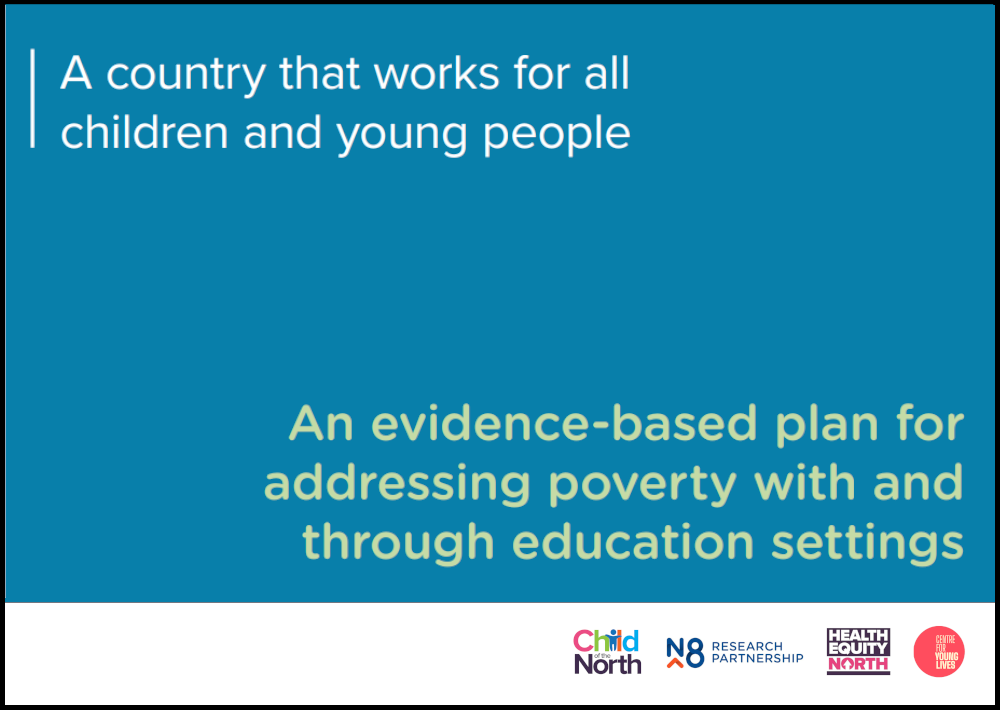Child of the North 2024/5 Campaign – Report 2
A country that works for all children and young people
An evidence-based plan for addressing poverty with and through schools
The second report in a year-long series – produced jointly by Child of the North and the Centre for Young Lives – that seeks to deliver a country that works for all children and young people, sets out a new plan to take the battle to reduce child poverty inside the school gates.
The report,An evidence-based plan for addressing poverty with and through schools, argues that schools and nurseries are anchors in the most deprived communities and they should play a leading role in those areas with the worst child poverty.
With over four million children in the UK living in poverty – one million of them in the North of England – the report highlights the negative impact that poverty is having on many children’s education, health, and future employment.
The report calls for:
- A new Government plan to support schools to reduce the impact of poverty as a first step of a national plan to reduce child poverty
- A targeted programme of funding to support schools in areas with the highest child poverty to co-ordinate services and provide support to reduce the impact of poverty on children
- The targeted extension of Universal Free School Meals in schools with high levels of child poverty
- A Child Poverty Unit in No. 10 and a Government Poverty Tsar to drive improvements in education for disadvantaged children
- A national Scientific Advisory Group for Children to ensure evidence, evaluation, and data-sharing lie at the heart of the programme
The report also highlights the link between child poverty and the current school attendance crisis, suggesting that children growing up in poverty are at increased risk of being persistently absent from school.
The analysis draws on evidence to show how many educational establishments have already become anchor institutions within some disadvantaged areas, particularly during the pandemic when schools and nurseries played a major role in supporting the needs of children, young people and families living in poverty. It calls for schools to be supported to mitigate the problems of poverty within the classroom and beyond.
It highlights existing initiatives that show the positive impact that projects within the school gates can have on alleviating child poverty, including ‘Poverty Proofing the School Day’ – developed and rolled out by Children North East – and the related ‘Cost of the school day’ from the Child Poverty Action Group.
It also sets out how universities can play an important role in raising attainment of children in their local areas. Durham University have begun to explore how they can play a role in raising the attainment of children in their area and are sponsoring a scheme to provide local schools around Durham with evidence-based programmes that support disadvantaged pupils.
Report webinar
In March a number of the report’s authors cae together to discuss their findings and to answer questions from the online audience.
Watch a recording of the webinar here
Anne Longfield, Executive Chair of the Centre for Young Lives, said:
“Intervening within the school gates to target the most vulnerable children to make sure they are provided with the support they need with pastoral support, family workers, educational psychologists, youth workers, breakfast and after school clubs, enrichment activities and holiday play schemes, can make such a difference to breaking down barriers and inequalities.
“Child poverty has become the elephant in the room in Westminster. Both parties have an opportunity at the forthcoming election to look at measures to tackle the root causes that are holding so many children back in their education. Free school meals should be a long-term ambition for all schools, but we should start by targeting individual schools in local areas with the most disadvantaged children and young people.
“The evidence is clear that investment in the UK’s education system is being squandered because the effects of poverty are not being addressed as an integral part of educational provision. Schools should no longer have to use sticking plaster solutions to tackle poverty.”
Professor Mark Mon Williams, Child of the North report series editor, said:
“Education is the most powerful tool available to a nation that wishes to invest in its future. Poverty is eroding the life chances of millions of children in the UK and fueling inequity and economic stagnation. There is hope for the UK’s future, but it requires immediate investment in the eradication of child poverty and the removal of poverty related barriers to education. The weight of scientific evidence shows we must act and work with and through educational establishments to give every child the best possible start in life.”
Dr Charmele Ayadurai, Assistant Professor of Finance at Durham University and report Lead Author, said:
“Despite the UK being one of the wealthiest economies in the world, with favourable economic conditions and rising wealth associated with the years between 2012 and 2021, this has worryingly not been translated into reductions in child poverty.
“The report makes it clear that we need to start prioritising children by promoting an equal life chance from all aspects. It is not enough to raise children’s aspirations through education alone without poverty proofing schools, narrowing the gaps in attainment, or by allowing children to sleep in a cold bedroom or study on an empty stomach. Our children are the hope for the future, let there be light.”
Sign up for updates on our 2024/25 Campaign
We will only use this data for the purposes of providing updates on the Child of the North 2024/25 campaign and report series. For more information see the Privacy Policy at https://www.sheffield.ac.uk/privacy
Previous Reports
Previous reports can be found archived on our Child of the North Reports page.
Contact Us
Stephen Parkinson, Research Partnership Manager




